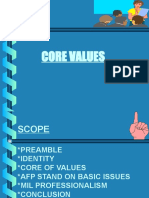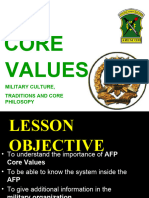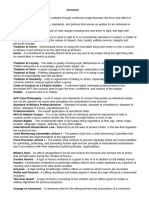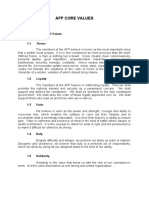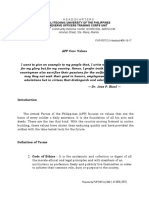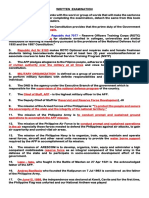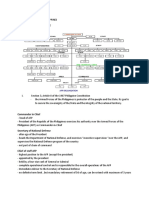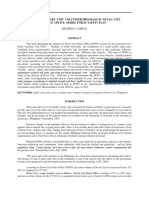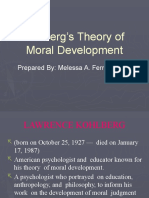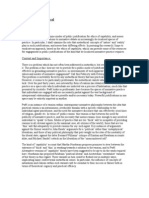AFP CODE OF ETHICS
IMPORTANCE OF PREAMBLE
The preamble briefly provides the reasons for promulgating the code of ethics. It states simply the identity, aspirations, vision,
mission, and commitment of the AFP. Specifically, the Code of Ethics hopes to professionalize the AFP, and to make it an
organization worthy of public trust and respect, and to instill in the hearts of each member of the AFP, the constitutional mandate to
protect the people, guard the sovereignty of the state, defend the national territory and support the democratic principles and the
AFP Code of Ethics, preamble is as shown:
ARTICLE I - IDENTITY
PREAMBLE There is
a need for the members
of the armed We, the Members of the Armed Forces of the Philippines, imploring the enlightenment from forces as
well as those Almighty God, in order to achieve and maintain a professional organization, worthy of public trust and outside of
the military respect, faithful to its constitutional mandate as the protector of the people, the sovereignty of the state,
organization the democratic institutions and the integrity of the national territory, freely and collectively commit to know.
Appreciate ourselves as our way of life, to abide and adhere to the provisions of this code of ethics which we hereby and
recognize the do obtain and promulgate unique role
of the AFP in relation to
the other sectors of society. Knowing who we are and the role we must play in public service sets us apart distinctively from the rest
and defines our accountability to the people we serve.
Sec 1 - Constitutional Mandate
Constitutional mandate emphasizes the recognition by the AFP of the constitution of the Republic as the legitimate
expression of the people's will, and that the AFP is mandated by the constitution to serve and protect the people, to secure the
sovereignty of the state, and to safeguard the integrity of its national territory from internal and external threats.
Sec 2 - Organization and Chain of Command
The Armed Forces of the Philippines is created by laws as part of the executive branch of the government. It is headed by the
President who is the Commander-In-Chief and who exercises control, supervision and authority through the AFP Chief-of-Staff. The
flow of authority from the Commander-In-Chief to the Chief of Staff down to the lowest echelon of authority is called the chain of
command. The AFP consist of a regular or standing force and a reserve or citizen armed force which may be mobilized to assist the
regular troops in security, civil assistance and development campaigns. There are three (3) major services comprising the AFP,
namely: The Philippine Army which conducts ground operations, the Philippine Air Force which secures the Philippine air space and
the Philippine Navy which secures the territorial waters. The three (3) branches of service are mutually supportive to each other.
They likewise support the PNP for the conduct of internal peace and order of the country and other government agencies in the
implementation of government programs.
Sec 3 - Commitment, Measures and Standards
The AFP shall be credible to the public in order to gain their trust, confidence, respect and support. Each member shall strive
to attain a high level of competence in the performance of their duties and to live up to the standards set forth by the organization in all
his undertakings.
ARTICLE II – AFP HISTORY
Sec 1 - Historical Perspective
The AFP identities itself with the Filipino people’s historical struggle for freedom and justice and their vigilance against any
attempt to violate the country’s integrity and sovereignty.
ARTICLE III - AFP CREED (SYSTEM OF BELIEFS)
Sec 1 - The AFP Core of Values
The profession of arms is a noble profession and demands from its members a distinct way of life governed by the enduring
core of values of honor, loyalty, valor, duty and solidarity. These values are incorporated in a belief-system that we all adhere to and
which guides the way we live our lives, perform our duties and account for all behavior under all circumstances. Those who shall not
1
�bind themselves to this belief-system and refuse to adjust their lifestyle according to the core values have no place in the military
service.
Sec 1.1 - Honor
The members of the AFP believe in honor as the most important virtue that a soldier must possess. It is in fact considered as
more precious than life itself. Without honor, a man is nothing but a beast. Honor means clean consciousness, personal dignity, good
reputation, unquestionable character, truthfulness, sincerity, honesty, credibility, integrity, and a modest but decent life. An honorable
soldier does not lie, cheat, steal, violate moral and ethical codes nor tolerate the violations of the code of honor is the sacred part of the
character of a soldier, violation of which should bring shame.
Sec 1.2 - Loyalty
The members of the AFP believe in unflinching loyalty. Thus, we shall promote the national interest and security as a
paramount concern. We shall support and defend the constitution. We shall be obedient to the duly constituted government. We shall
obey the orders of those legally appointed over us. We shall support those who lead us and those who serve with us.
We believe that loyalty enhances our dedication and pride in our unit, fosters unity, and promotes sincere concern for our
fellow soldiers. When we are loyal, we show our adherence to the democratic principles. We fulfill the constitutional mandate and
recognize legal authority.
Sec 1.3 - Valor
We believe in valor as the power and strength, courage and ability to overcome fear which enables the soldiers to carry out
their mission and to accomplish what is seemingly impossible. It is more than bravery or ability to endure pain.
Valor is calmness and presence of mind in the heat of battle where danger or death is imminent. It is the courage to stand for
what is right and the perseverance to make it difficult for others to do wrong.
Sec 1.4 - Duty
Despite difficulty and danger, we perform our tasks as ordered or implied. Discipline and obedient, we believe that duty is a
personal act of responsibility which we show by doing all our assigned tasks to the best of our ability. We place duty above our own
personal desires even sacrificing our own personal comfort and safety. Duty required that we likewise accept responsibility for what
we do or fail to do, not only for our actions but for the actions of those who work under our control and supervision. Duty means we
think less of ourselves and think more of mission accomplishment. Duty is devotion to others’ welfare. Because the AFP will fail if it is
nothing but a collection of individuals who think only of themselves.
Sec 1.5- Solidarity
Solidarity is the value that binds us with the rest of our comrades-in-arms. It is the value that makes us one strong and
united organization. Thus, we reject all other forms of organization. Solidarity is developed if we are well trained and well led. We
developed among ourselves camaraderie and esprit-de-corps as the leaders and the subordinates exchange personal and professional
examples of excellence, solidarity means unity, working together through thick and thin. It is working together as part of a team.
Section 2 - The AFP Stand on Basic Issues
Like most armed forces in third world countries, the AFP has been called upon to perform certain tasks which are non-military
in nature. Our traditional role as guardian of peace and stability and protector of the state and its people has expanded because the
government believes that when all the other agencies, organizations and instrumentality of the governments shall have failed, the
military stands united, solid, and strong to contribute to the national goals and objectives. So much to that at present our role
encompasses the social, economic, political, psychological, and cultural aspects of national security and development.
The most striking and significant role of the AFP in the political aspect of national survival is the civilian-backed
revolution in 1986 which ended the 20-year dictatorship of the late President Marcos. For a long time, this single act became a
controversial national issue because the AFP appeared to be divided into loyalists and non-loyalist. The word "loyalty" has been
redefined into its true meaning which is support to the constitution and to the democratic principles embodied on it rather than
support to a particular person, in this case, the head of the state.
These basic issues therefore incorporated in the AFP Code of Ethics to express the stand of the members of the AFP on
some basic national issues and to unify us towards a single line of action or thinking on each issue. It also aims to bridge the gap of
misunderstanding and divisiveness among the ranks and files resulting from ignorance of our traditional and expanded roles as men-in-
uniform.
Sec 2.1 - The AFP Organization
The AFP organization provides that the AFP should be organized in such a manner that it can function effectively to
accomplish its mission with minimum cost and maximum result. This is to avoid creation and manning of new units that merely
duplicates the function of another unit or office.
The AFP organization must also promote the active participation of the people in the defense of the state and in civil
assistance projects during disasters, calamities and national emergencies. The creation of CAFGU Active Auxiliaries, the
2
�Bantay-Bayan, and the Civilian Volunteer Organization (CVO), not to mention the development of our reserve units in the country
are some of the organizational reforms embodied in the AFP organization.
Sec 2.2 - Supremacy of Civilian Authority
Supremacy of civilian authority emphasizes the legal and moral obligation of the soldier as an ordinary citizen of the
republic to obey the laws, carry-out directives, and subscribe to regulations enacted and issued by the legislative, judicial, and
executive branches of the civil government. We uphold the supremacy of the civilian authority over the military when we pay our
taxes, cast our votes to elect government officials, enforce writs issued by the court, and abide by all laws passed by congress. We
uphold the supremacy of the civilian authority over the military when we submit ourselves to the command and control of the President,
a civilian, as our Commander-In-Chief.
Sec 2.3 - Chain of Command
Chain of command deals on the generally accepted principles that a military action being executed should pass the approval
or consent of the commander at each level or echelon of command from lowest to highest without bypassing any approving authority or
taking the action upon one's self as his prerogative. There are certain military actions that subordinate unit commanders are delegated
the authority to execute without the need to consult or inform higher approving authority. Nevertheless, the chain of command shall
be followed until the clearance to execute the action reaches the level of the approving authority for such action. Rebel soldiers
who followed orders of RAM officers of those sympathetic to their cause did not follow the AFP chain of command. If a legal military
action fails, command responsibility comes into picture. However, the extent of command responsibility varies on every particular
situation and an appropriate board shall be charged to determine who shall be responsible for such failure.
Generally, command responsibility extends two levels of command higher. When a platoon is walloped by the enemy because
of the failure of the platoon leader to execute the orders properly, his company commander and battalion commander are likewise
responsible for the failure.
Sec 2.4 - Military Leadership
Military leadership summarizes the significant role of a military leader or commander, to influence his men to carry-out its
mission, perform assigned tasks, or fulfill its obligations and functions. While leading the men to mission-oriented activities, the military
leaders which include officers and key NCO’s should equally have sincere concern towards the morale and welfare of the members of
their units.
Sec 2.5 - People's Support
People's support is a statement of the acknowledgment by the AFP of the vital importance to achieve peace and order. No
army in the world has ever succeeded without the support and cooperation of its people. The person supports the AFP when they
inform our line units on enemy presence and activities. But people's support varies from one area to another.
To get people's support, the members of the AFP should exercise prudence and justice when dealing with the civilians. The
soldiers should respect and protect the rights of the people, their beliefs, ways of life and living conditions.
Sec 2.6 - National Development
The AFP must be a catalyst of change, reform and development. It must actively participate in endeavors that will contribute
to national progress. It must work hand-in-hand with other organizations in bringing the programs of the government down to the
grassroots level.
Sec 2.7 - Partisan Politics
The members of the AFP shall not engage in partisan politics. Its involvement shall be limited only to the exercises of his right
to vote the candidate of his choice and to assist in ensuring a clean and honest election. The members should not be an instrument of
a politically motivated activity such as campaigning for a particular candidate or serving as a force to oust a political leader in power
such as coup participation.
Sec 2.8 - Democracy
The AFP adheres to the principles of democracy. It believes that the Philippine government is the embodiment of the Filipino
people's will and was established to protect their inherent rights and to fulfill their aspirations as a nation. The real power and
authority of the government emanates from the citizens who elected our government officials to represent them and to express their
will.
Serving a government of the people, for the people and by the people, the AFP recognizes its role to protect the people and to
participate in democratic processes. It shall not engage in activities that are contrary to the sovereign will of the people or detrimental
to their welfare.
3
�Sec 2.9 -National Interest
The AFP realizes that the protection of national interest is for the common good of the people. In accomplishing the mission
given to AFP it shall keep in mind that national interest is of paramount concern and must be enhanced and protected.
Our sending of troops in Kalayaan Island in the controversial Spratlys Islands being contended by six (6) other nations is for
the protection of our national interest.
Sec 2.10 - Peace
The AFP believes that program and development can only be attained if there is stability, peace and order. While the
members of the AFP are trained to fight the enemy using force, it is likewise trained to prevent conflict, preserve peace and to restore
orderliness in the strife-torn areas. The AFP, the guardian of peace is tasked to promote an atmosphere of tranquility, orderliness and
harmony among the people based on justice, so that development and progress will not be hampered.
Sec 2.11 - War
The AFP believes that war or the use of force against the enemy of the state shall be restored to only when all the
peaceful means shall have failed and no other option is left to resolve the conflict. It supports the people's will to renounce war as an
instrument of national policy. In our present counter-insurgency campaign, army units have opened doors for reconciliation and laying
down of enemy arms in order for them to participate in the country's socio-economic development. Dialogues, pulong-pulong, and sot
operations are preferred than battalion sized combat operations or a full-scale war against insurgents.
Sec 2.12 - Use of Armed Force
When implementing government policies pertaining to security, the AFP must act with restraint as far as use of force is
concerned. When the use of arms is necessary, it must have the authority of the duly established government. The size of the force
to be utilized must be the smallest possible to fulfill its mission. The "Rizal Ali" incident in Cawa-Cawa where two marine battalions
and several other units were utilized and where air to ground missiles were employed against Ali’s group of about fourteen (14) men
became a controversial issue of "over-killing" a few years back.
Today, use of heavy weapons such as howitzers and the employment or airstrike against the NPA guerrillas have to be
cleared by proper authorities.
Sec 2.13 - Social Justice
The members of the AFP shall be instrument in the promotion of social justice. It shall subscribe to the generally accepted
principle that all men are created equal and every citizen must be given the same rights and opportunities in life and equal protection
from the government. The AFP shall support the equalization of socio-economic forces, such as bridging the gap between the rich and
the poor. It shall advocate the idea that those who have less in life must have more in law. The AFP shall assist the other government
agencies in the speedy and effective implementation of programs that will benefit the general public rather than an elite favored group.
The AFP shall likewise refrain from participating in any activity which is detrimental to the welfare of the people socially and
economically.
Sec 2.14 - Human Rights
The members of the AFP shall respect the inherent rights of an individual as a "human being". In the performance of its
mission, the troops must see to it that the lives and properties of non-combatants and innocent civilians are well protected.
The AFP shall not resort to inhuman acts like massacre, torture, salvaging, conviction without trial and other acts that degrade
the dignity of a person. It shall pledge to protect the rights contained in the declaration of human rights and all other declarations to
which our country is a signatory.
Sec 2.15 - Enemies of the State
The AFP shall consider the following as enemies of the state:
(1) Those who shall violate the sovereignty of the Philippines such as foreign aggressors whose intention is to
occupy and control the national territory or part thereof.
(2) Those who resort to violence as a means to achieve their ends such as CCP/NPA guerrillas.
(3) Those who shall not accept the supremacy of civilian authority over the military, such as the coup plotters and
participants.
(4) Those who shall dismember the country or any part thereof, such as the Abu Sayaff Group (ASG) and other
secessionist groups.
4
� (5) Those who shall engage in organized crimes, such as gambling syndicates, drug pushers, gun runners, hired
killers, etc..
(6) Those who shall organize the populace for the purpose of alienating their allegiance from the state, such as the
national democratic front, and the sectoral organizations under its umbrella.
ARTICLE IV– AFP MEMBERSHIP
Sec 1 - General Statement – The AFP members make the most important asset of all the organizations’ resources. Efforts shall,
therefore, be exerted to attract only the best qualified and most deserving in order to maintain high standards set forth in this code.
COMMISSIONED OFFICER
1. Must be natural born citizen of good moral character, physically and mentally fit, single and within the age bracket
from 18 – 26 years of age.
2. Must be Baccalaureate Degree holder.
3. Must have attained an average IQ rating in the general military classification test prepared and administered in
accordance with AFP regulations.
4. Must be of minimum height as set forth in AFP regulations.
ENLISTED PERSONNEL
1. Must be natural born citizen of good moral character, physically and mentally fit, single and within the age bracket
from 18 – 26 years of age.
2. Must have earned at least 72 units in college or its equivalent.
3. Must be of a minimum height as set forth in the AFP regulations.
4. Must have attained an average IQ rating in the general military qualifications test.
ARTICLE V - MILITARY PROFESSIONALISM
Military professionalism is the heart and soul of the whole AFP code of ethics. It emphasizes that being public servants, we in
the AFP are expected to perform our duties and responsibilities with utmost competence and efficiency. Our right to bear arms as one
of the peculiarities of the military service calls for the assurance to the people that their safety, protection and welfare shall be our
paramount concern.
Sec 1 - General Statement - The members of the AFP are public servants who are oath-bound to fulfill the lofty mandate of the
constitution. The peculiarity of military service, which requires the right to bear arms, calls for a corresponding assurance of
professionalism from every military man.
Sec 2. Professionalism
The people expects the AFP to perform its tasks as mandated by the constitution with the highest degree of excellence by
applying expertly the basic and specialized skills of soldiery while adhering strictly with the code of ethics and all laws and statutes of
the land. This dedicated performance of duty is what we call military professionalism. A professional soldier is loyal to the republic,
competent in his assigned tasks, of unquestionable character and avoids all forms of illegal and immoral activities.
Sec 3.1 - Standard of Loyalty
All military personnel shall be loyal and true to the Republic of the Philippines, the Constitution, the AFP and to the people. We
are loyal to the Republic when we serve its interest and protect its territorial integrity against the enemy, even if it shall cost our lives.
We are loyal to the Constitution when we support and defend it, and when we obey the laws of the land and recognize the
supremacy of the civilian authority. We are loyal to the AFP when we support and defend it against those who try to show disunity and
divisiveness, and when we abide the rules and regulation of the military organizations. We are loyal to the people when we think of
their safety and welfare above our own interest.
Sec 3.2 - Standard of Competence
All military personnel must be competent in the performance of his duties. By competence means the ability or capability to do
what is expected him to do and to do it well.
We are competent for a job when we have acquired the knowledge and skills through training and experience and effectively
apply it to achieve optimum result based on a certain standard of excellence. Knowledge and skills must be backed-up by self
motivation, dedication to work, and aspiration for greater level of achievement.
5
� In order to be competent, we must likewise be physically fit to perform our duties, because we become ineffective when we
are sickly and ill which consequently affects our level of performance. Our character traits must likewise be improved in order to be
competent because most of the problems on unit effectiveness can be traced on the poor behavior and attitude of the officer and men
towards work.
Sec 3.3 - Standard of Ethics
Every soldier must conform to the accepted principles of right conduct, being observed in the society which he is a part,
apart from being a soldier, he is also a citizen of the community, because the military community is only a part of a larger society -
the "Filipino Society".
Some of the principles of right behavior expected not only in the Philippine society but in all other civilized societies are
honesty, justice, truthfulness and concern for others. We are honest when we render service no lesser than the required working
hours, when we do not profit from government transaction, when we do not divert funds for our personal use, when we do not
manipulate documents for the benefit of a favored individual or group.
We are just when we deal with the people without bias and partiality. We are just when we render service to everyone
regardless of his status in life. We are just in the discharge of our duties if our paramount concern is for the general good.
We are truthful when we do not tell lies, when we keep our promises and commitments, when we speak of the truth regardless
of the consequences. We are concerned with others when we place high regards for his well-being, when we render him assistance
without being ordered to do so, when we sympathize with the suffering of the poor, the sick, and the underprivileged.
Sec 3.4 - Standard of Morals
The soldier must be aware that he has the capacity to distinguish between what is right and what is wrong. To be moral is to
do the right things and to avoid the wrong ones. The society expects us to respect its accepted practices, customs and traditions
which are institutionalized in order to have order in the community. Some of these accepted norms are respect of elders and authority,
fidelity to an oath. We are moral if we are faithful to our pledge as a soldier to serve our country above self. We are moral if we are
faithful to our wife/or husband and true to our oath to be faithful.
Sec 4 - Unprofessional Acts
These behaviors that fall short of the professional standards as enumerated in the AFP code of ethics are considered
unprofessional acts. Some of these offenses are acts of disloyalty, acts of incompetence, unethical acts and corrupt acts.
Sec 4.1 - Acts of Disloyalty
We are disloyal when we do something or refuse to do something that constitute betrayal of our country and people, non-
support to our duly constituted government, and disregard to the AFP chain of command. Some disloyal acts are cowardice in the face
of the enemy, desertion or abandonment of post/duty. Absent Without Official Leave(AWOL) and with no intention to return,
insubordination, contempt or disrespect to superior, bypassing the chain of command, willful disobedience to a lawful order,
participation in a violent act to overthrow the government, mutiny, sedition, treason, coup-de-etat, aiding the enemy and refusal to
execute duty during time of crisis.
Sec 4.2 - Acts of Incompetence
We are incompetent when we lack the required knowledge, skills, physical attributes and character traits necessary for
the adequate performance of duty and accomplishment of mission. Considered incompetent are those AFP personnel who shall fail
to attain the minimum passing grade in any AFP training and education program such as individual career and specialization
courses, those who are unable to meet the physical, medical, mental and moral fitness test requirements of the service and those
who are indifferent or half-hearted towards duty.
Sec 4.3 - Unethical Acts
Unethical acts are deviations from the established and accepted ethical and moral standards of behavior and performance laid
down in the AFP code of ethics. Some of these unethical acts are using government time for outside employment or sideline,
arrogance such as unnecessary use or display of firearms, unwarranted assertion of rank, position or authority, tolerating
irregularities in the military service, allowing spouse/dependents to interfere in official functions, fornication such as adultery,
concubinage, homosexuality, etc.., engaging in vices such as gambling, excessive drinking of intoxicating liquor, womanizing, use
of prohibited drugs like shabu, marijuana and the likes.
Sec 4.4 - Corrupt Acts
Corrupt acts are crimes against public interest, public morals, property, chastity, civil status of person, and honor. We are
corrupt when we are dishonest, unjust, and commit immoral acts. Some of the corrupt acts are use of government funds or properties
other than what they are intended for, including its manipulation to amass wealth, falsification of records to favor any party, and
receiving or demanding gifts in exchange for doing a favor.
6
� ARTICLE VI – AFP CUSTOM AND TRADITION
Sec 1 - General Statement - The importance of customs and traditions to the AFP cannot over-emphasize. The continued use of
desirable practices that has long been accepted by our predecessors provides a reserve strength that cannot be obtained from new
approaches that still require testing. Customs that are cherished provide a simplification of lifestyles and serve to inspire us to emulate
our honorable predecessors.
Sec 2 - Definition of Terms
2.1 Traditions – are inherited principles, standards and practices that serve as guide for individuals or groups.
2.2 Customs – are accepted practices realized through continued usage that take force and effect of a common law.
Sec 3 - Military Traditions
The following are the significant military traditions:
3.1 Tradition of Valor – The Filipino soldiers have epitomized valor during their gallant defense of Tirad Pass, Bataan,
Corregidor, and other countless battles against foreign enemy forces and local lawless elements.
3.2 Tradition of Duty – The Filipino soldier has exemplified himself throughout history as a dedicated public servant who
performed his tasks with a deep sense of responsibility and self-sacrifice by making himself available at all times whenever situation
demands.
3.3 Tradition of Honor – General Artemio Ricarte, the first recognized Captain General, as well as the other founding
fathers of the AFP during those difficult times have exemplified the value of Honor by leading a life of personal dignity and self worthy in
time of peace or in war.
3.4 Tradition of Solidarity – The strongest, most enduring and powerful military tradition that bound the soldiers in
oneness to the people they serve.
3.5 Tradition of Loyalty – The Filipino soldier has held the respect of the nation by shedding blood and offering the
supreme sacrifice in the defense of the country.
Sec 4 - Military Customs
The following are some of the significant customs in the AFP:
4.1. Salute – Men of arms have used some form of military salute as an exchange of greetings since the earliest times.
4.2. Rank Has Its Privileges (RHIP) – Whenever a choice is to be made, such as selection of billets of quarters or electing
means of transportation the option of selection follows rank with senior given the privilege to select first.
4.3. Place of Honor – the place of honor is on the right. Accordingly, when a junior walks, rides, or sit with a senior he
takes position abreast and to the left of the senior.
4.4. Use of the word “Sir” – the word “SIR” is issued in military conversation by the junior officer in addressing a senior,
and by all soldier in addressing officers.
ARTICLE VII – GENERAL PROVISIONS
Sec 1. Legal Force – This Code of Ethics shall be guided by the provisions of the Constitution of the Republic of the
Philippines, Article of War, Revised Penal Code, R.A. 6713 (Ethical Standards of Public Officials and Employees) R.A. 3019 (Anti-Graft
and Corrupt Practices Act), R.A. 6869 (Anti-Coup d’ etat Act) and other special laws.
Sec 2. Moral Force – All members of the Armed Forces of the Philippines in the implementation of this code shall morally
bound by the Divine Laws, Oath of Office, AFP Customs and Traditions, AFP Code of Conduct.
CONCLUSION
The topic is very relevant during these time when the eyes of the public are focused on the AFP especially on the issues of
diminishing among the ranks and files and politicization of certain groups on men-in-uniform, not to mention the involvement of
some military elements in illegal activities and graft and corruption. While these are done only by a very small percentage of our total
strength, we cannot help but be alarmed because the acts of a few scalawags have tarnished the name of the whole organization. In
our desire to produce truly professional armed forces, we have started various reforms in our organization. This continuing pursuit of
7
�excellence brought us to the realization that there is a necessity to lay down and define the norms of conduct of the soldier relative
to the profession of arms in our country today.
Our final product is the AFP code of ethics, a responsive and living set of standards that truly reflects the AFP culture in the
light of the prevailing circumstances. Through this code, we have shaped the ideals and aspirations of the men-in-uniform into a district
course of conduct by which we can live and govern ourselves.
Originally drafted and prepared by over one hundred (100) selected officers and men, the code was brought to the men in the
field for comment and consultation. It was ratified by the members of the AFP on 17 August 1991. The ratification is the basis of strong
commitment of all officers and men of the AFP to achieve and maintain a professional organization that is worthy of public trust and
respect and faithful to the constitutional mandate as the "protector of the people".
The AFP is committed for the strict implementation of the code of ethics, without discrimination, regardless of rank, position,
assignment, relations, political connections, religion, tribe and source of commission.







